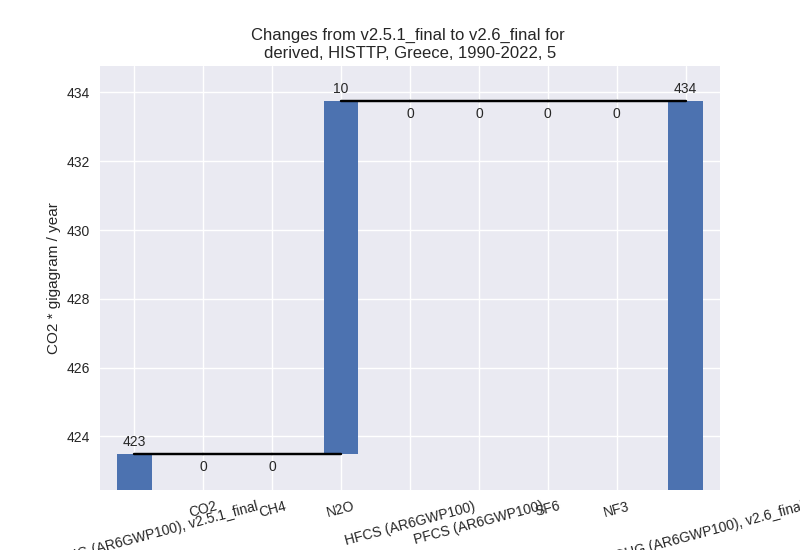Changes in PRIMAP-hist v2.6_final compared to v2.5.1_final for Greece
2024-09-24
Johannes Gütschow
Change analysis for Greece for PRIMAP-hist v2.6_final compared to v2.5.1_final
Overview over emissions by sector and gas
The following figures show the aggregate national total emissions excluding LULUCF AR6GWP100 for the country reported priority scenario. The dotted linesshow the v2.5.1_final data.
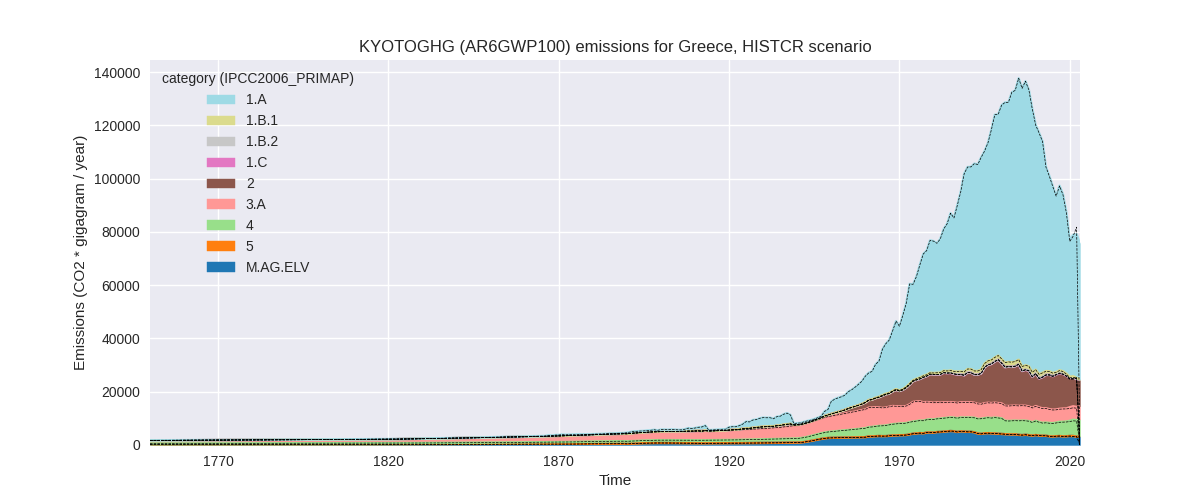
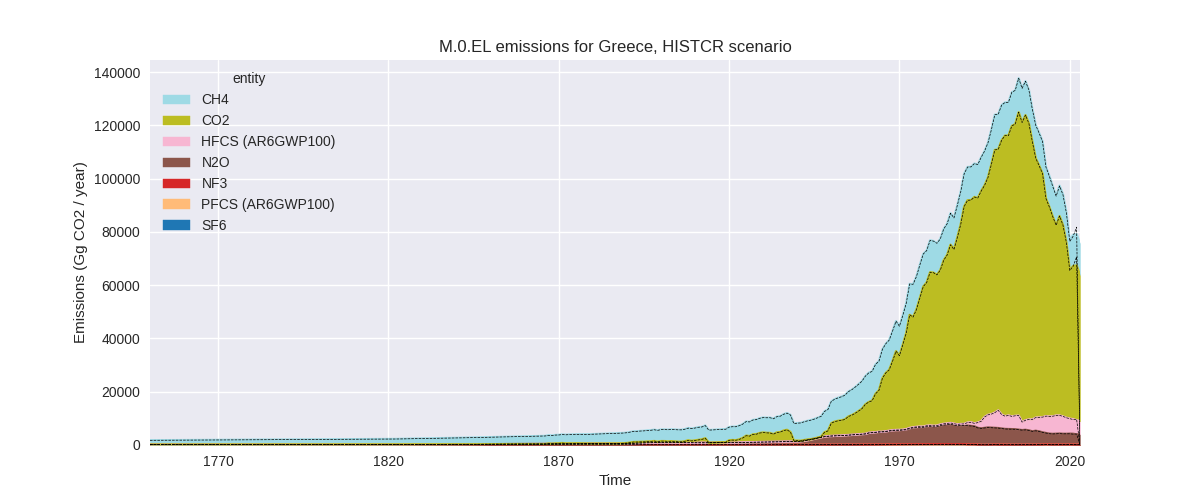
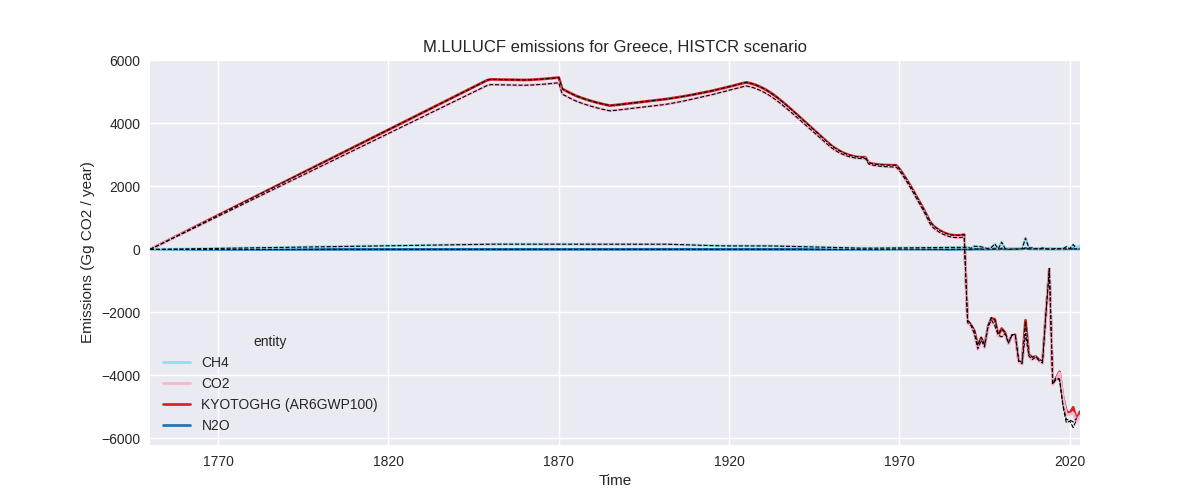
The following figures show the aggregate national total emissions excluding LULUCF AR6GWP100 for the third party priority scenario. The dotted linesshow the v2.5.1_final data.
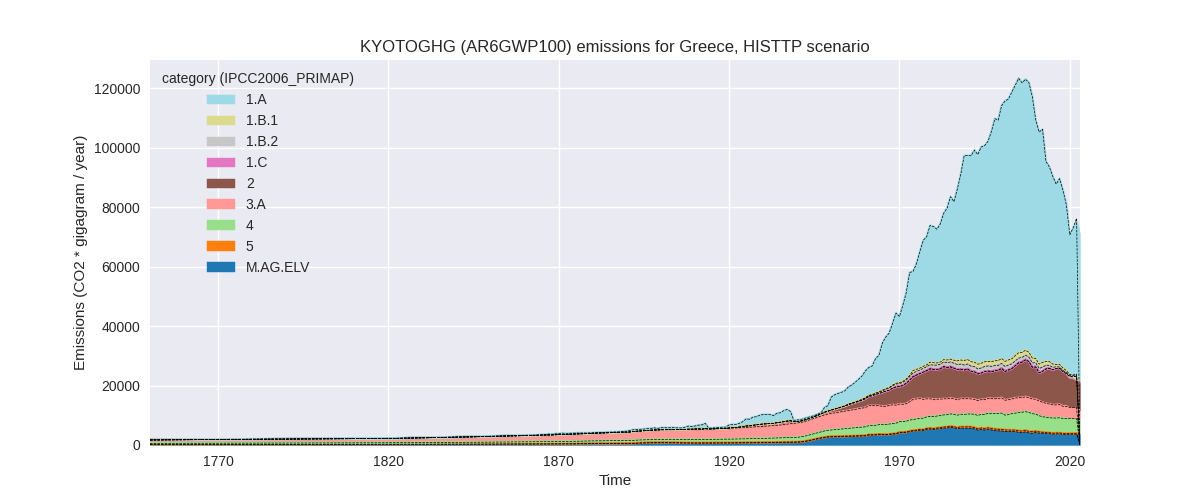
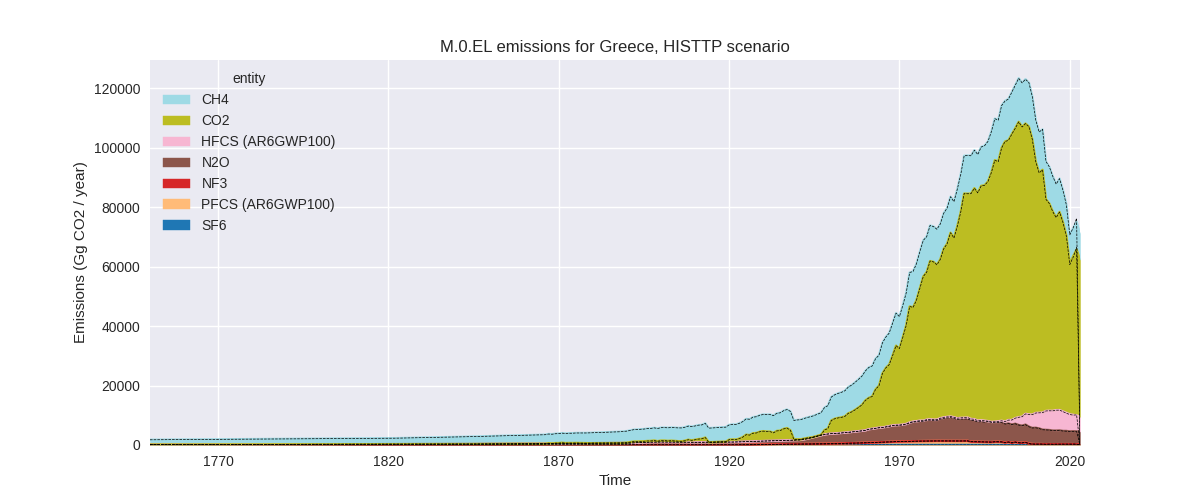
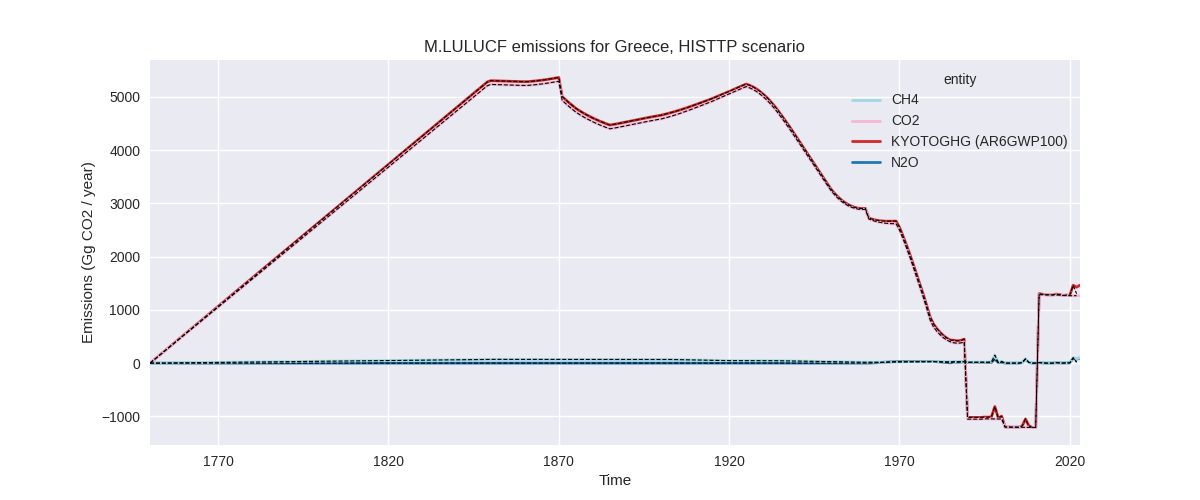
Overview over changes
In the country reported priority scenario we have the following changes for aggregate Kyoto GHG and national total emissions excluding LULUCF (M.0.EL):
- Emissions in 2022 have changed by -3.2%% (-2652.92 Gg CO2 / year)
- Emissions in 1990-2022 have changed by -0.0%% (-53.29 Gg CO2 / year)
In the third party priority scenario we have the following changes for aggregate Kyoto GHG and national total emissions excluding LULUCF (M.0.EL):
- Emissions in 2022 have changed by -1.6%% (-1189.38 Gg CO2 / year)
- Emissions in 1990-2022 have changed by -0.1%% (-52.00 Gg CO2 / year)
Most important changes per scenario and time frame
In the country reported priority scenario the following sector-gas combinations have the highest absolute impact on national total KyotoGHG (AR6GWP100) emissions in 2022 (top 5):
- 1: 1.A, CO2 with -2315.81 Gg CO2 / year (-4.2%)
- 2: 2, CO2 with -541.17 Gg CO2 / year (-10.1%)
- 3: 4, CH4 with 488.22 Gg CO2 / year (8.9%)
- 4: 2, HFCS (AR6GWP100) with -216.72 Gg CO2 / year (-3.9%)
- 5: M.AG.ELV, N2O with -137.99 Gg CO2 / year (-4.6%)
In the country reported priority scenario the following sector-gas combinations have the highest absolute impact on national total KyotoGHG (AR6GWP100) emissions in 1990-2022 (top 5):
- 1: 1.A, CO2 with -73.66 Gg CO2 / year (-0.1%)
- 2: 4, CH4 with 67.86 Gg CO2 / year (1.3%)
- 3: 2, HFCS (AR6GWP100) with -40.89 Gg CO2 / year (-0.8%)
- 4: 2, CO2 with -16.98 Gg CO2 / year (-0.2%)
- 5: 3.A, CH4 with 15.21 Gg CO2 / year (0.3%)
In the third party priority scenario the following sector-gas combinations have the highest absolute impact on national total KyotoGHG (AR6GWP100) emissions in 2022 (top 5):
- 1: 2, CO2 with -578.32 Gg CO2 / year (-13.5%)
- 2: 4, CH4 with -483.80 Gg CO2 / year (-10.2%)
- 3: 2, HFCS (AR6GWP100) with -201.93 Gg CO2 / year (-3.6%)
- 4: 2, PFCS (AR6GWP100) with -62.20 Gg CO2 / year (-21.7%)
- 5: 1.A, CO2 with 61.45 Gg CO2 / year (0.1%)
In the third party priority scenario the following sector-gas combinations have the highest absolute impact on national total KyotoGHG (AR6GWP100) emissions in 1990-2022 (top 5):
- 1: 4, CH4 with -48.43 Gg CO2 / year (-1.0%)
- 2: 2, CO2 with -17.49 Gg CO2 / year (-0.3%)
- 3: 5, N2O with 10.26 Gg CO2 / year (2.4%)
- 4: 1.A, CO2 with 9.41 Gg CO2 / year (0.0%)
- 5: 2, HFCS (AR6GWP100) with -6.12 Gg CO2 / year (-0.2%)
Notes on data changes
Here we list notes explaining important emissions changes for the country. ’' means that the following text only applies to the TP time series, while means that it only applies to the CR scenario. Otherwise the note applies to both scenarios.
- The 2024 EEA inventory data has been added.
- Most changes in 2022 emissions in the CR scenario come from a smaller emissions rebound than modeled by third party sources and extrapolation.
- For waste CH4 EEA 2024 emissions differ from CRF2023 for all years (more pronounced starting in 2005).
- M.AG.ELV, N2O has changes for several years as well.
- In the TP scenario 2022 changes are due to adjusted 2022 data for cement CO2 and f-gas data.
- Changes in sectors 4 and 5 in the TP scenario are due to the removal of FAOSTAT data.
- Cumulative emissions have changed only slightly in both scenarios.
Changes by sector and gas
For each scenario and time frame the changes are displayed for all individual sectors and all individual gases. In the sector plot we use aggregate Kyoto GHGs in AR6GWP100. In the gas plot we usenational total emissions without LULUCF. ## country reported scenario
2022
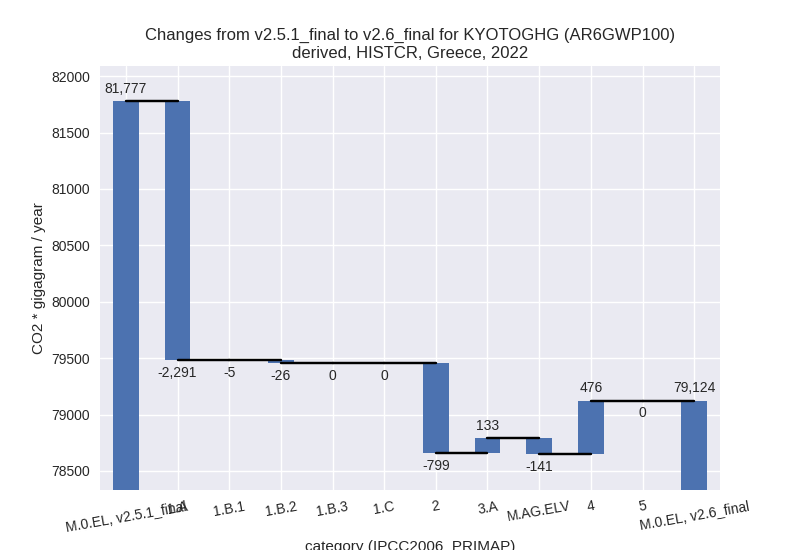
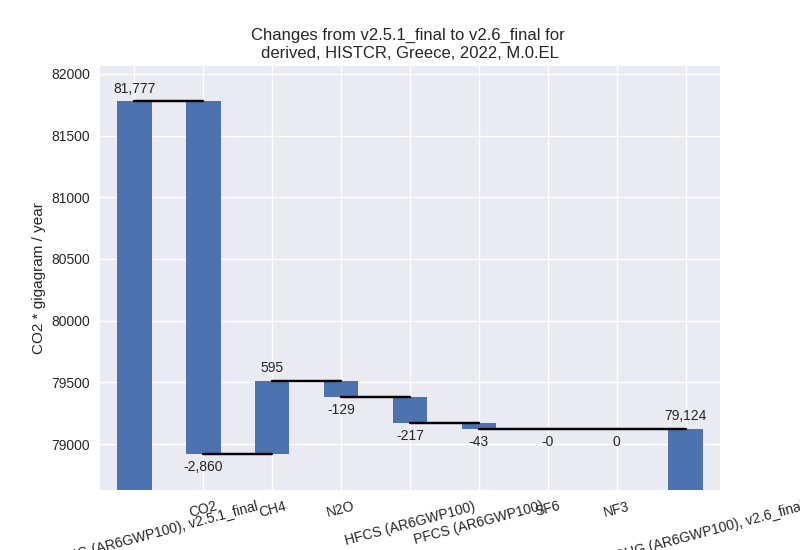
1990-2022
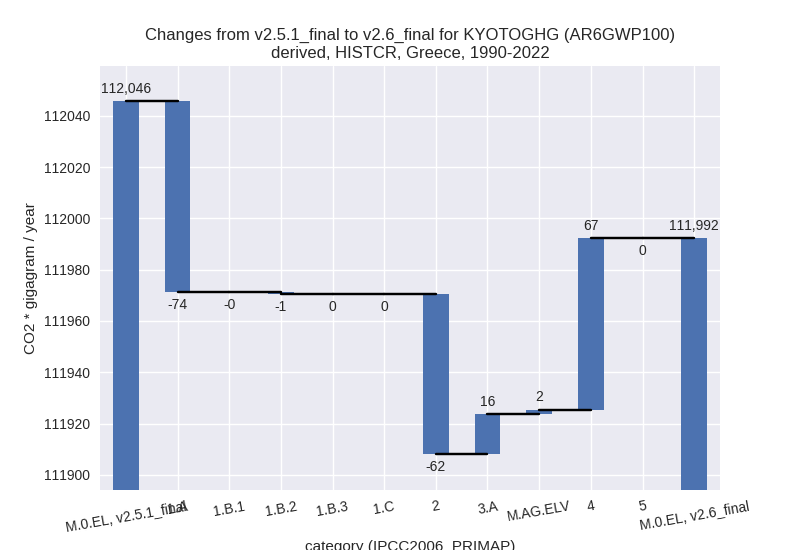
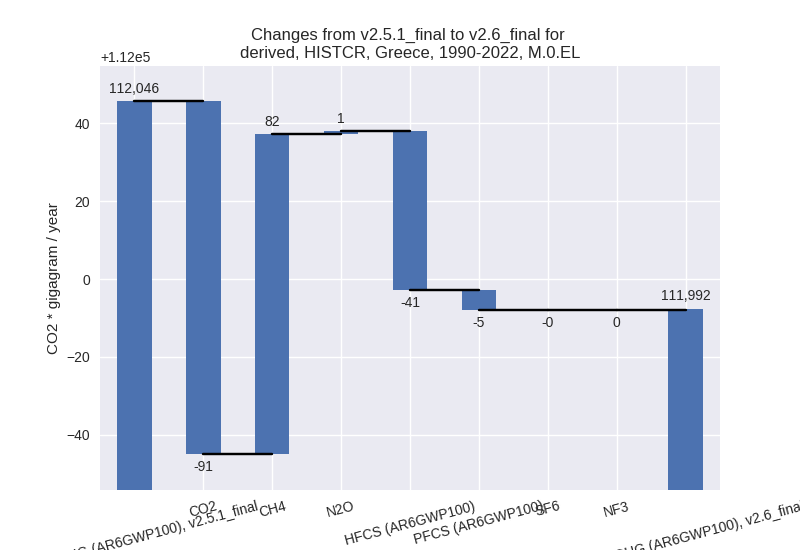
third party scenario
2022
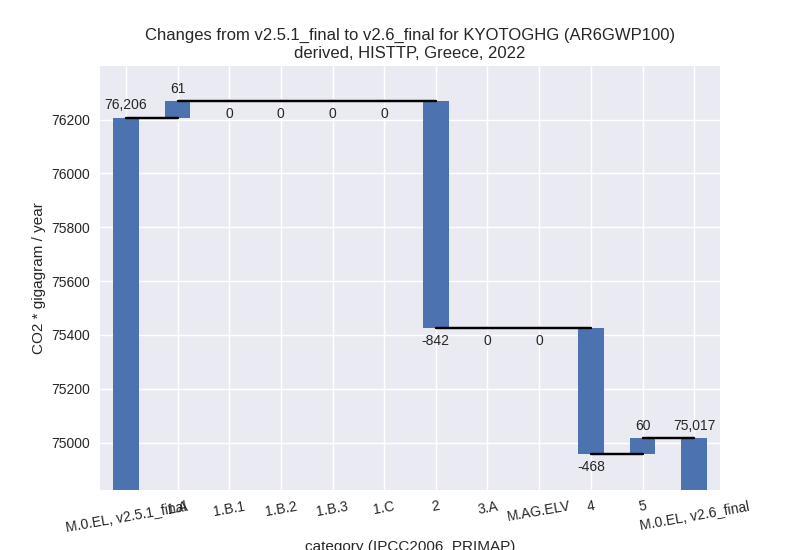
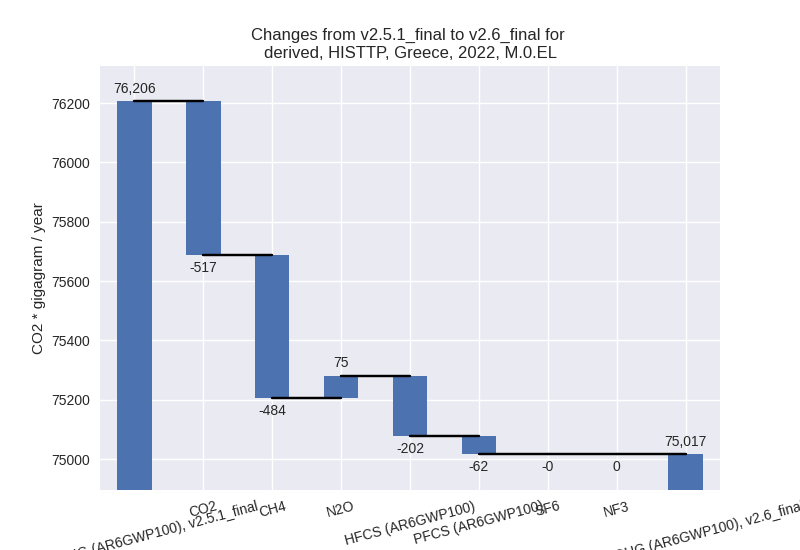
1990-2022
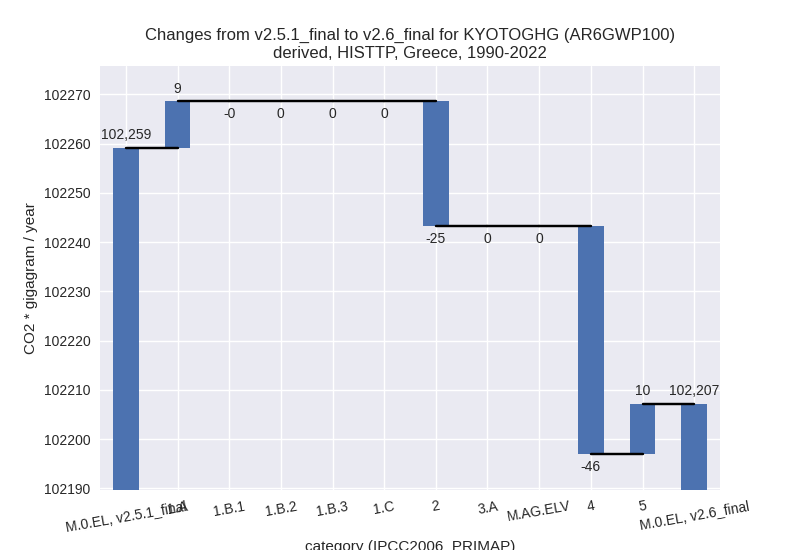
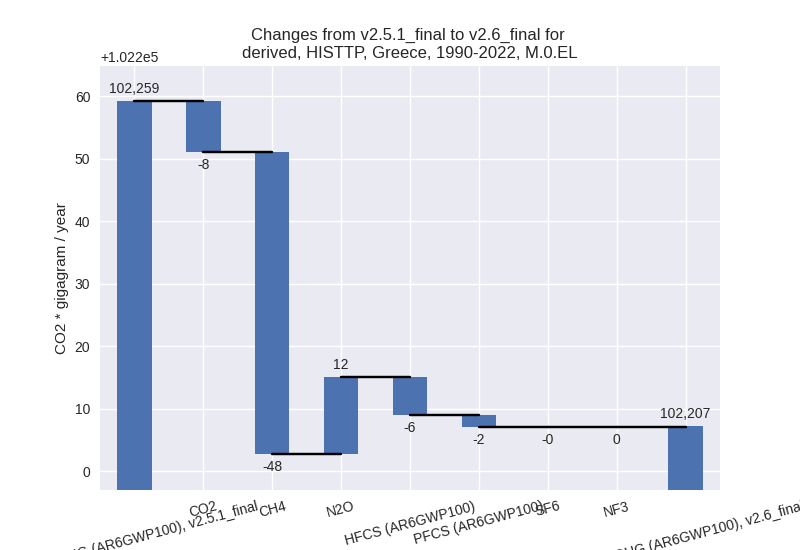
Detailed changes for the scenarios:
country reported scenario (HISTCR):
Most important changes per time frame
For 2022 the following sector-gas combinations have the highest absolute impact on national total KyotoGHG (AR6GWP100) emissions in 2022 (top 5):
- 1: 1.A, CO2 with -2315.81 Gg CO2 / year (-4.2%)
- 2: 2, CO2 with -541.17 Gg CO2 / year (-10.1%)
- 3: 4, CH4 with 488.22 Gg CO2 / year (8.9%)
- 4: 2, HFCS (AR6GWP100) with -216.72 Gg CO2 / year (-3.9%)
- 5: M.AG.ELV, N2O with -137.99 Gg CO2 / year (-4.6%)
For 1990-2022 the following sector-gas combinations have the highest absolute impact on national total KyotoGHG (AR6GWP100) emissions in 1990-2022 (top 5):
- 1: 1.A, CO2 with -73.66 Gg CO2 / year (-0.1%)
- 2: 4, CH4 with 67.86 Gg CO2 / year (1.3%)
- 3: 2, HFCS (AR6GWP100) with -40.89 Gg CO2 / year (-0.8%)
- 4: 2, CO2 with -16.98 Gg CO2 / year (-0.2%)
- 5: 3.A, CH4 with 15.21 Gg CO2 / year (0.3%)
Changes in the main sectors for aggregate KyotoGHG (AR6GWP100) are
- 1: Total sectoral emissions in 2022 are 54462.43 Gg
CO2 / year which is 68.8% of M.0.EL emissions. 2022 Emissions have
changed by -4.1% (-2321.72 Gg CO2 /
year). 1990-2022 Emissions have changed by -0.1% (-75.31 Gg CO2 / year). For 2022 the
changes per gas
are:
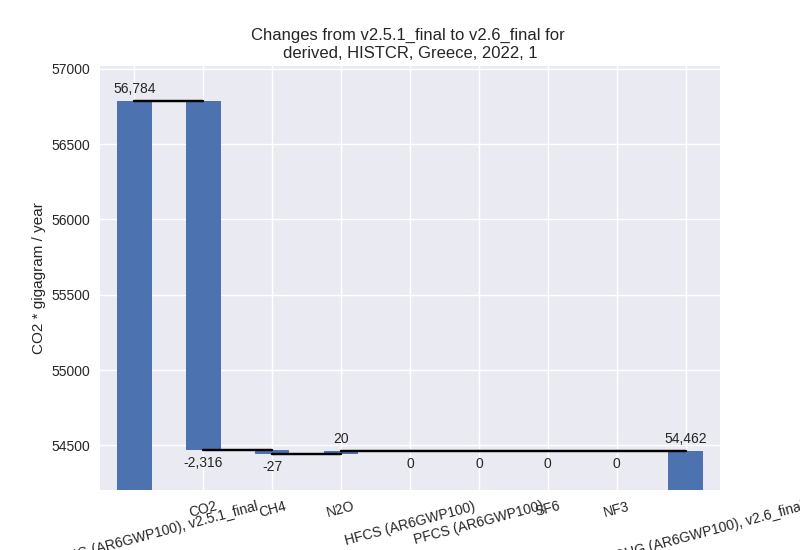
The changes come from the following subsectors:- 1.A: Total sectoral emissions in 2022 are 53984.88
Gg CO2 / year which is 99.1% of category 1 emissions. 2022 Emissions
have changed by -4.1% (-2291.36 Gg
CO2 / year). 1990-2022 Emissions have changed by -0.1% (-74.39 Gg CO2 / year). For 2022 the
changes per gas
are:
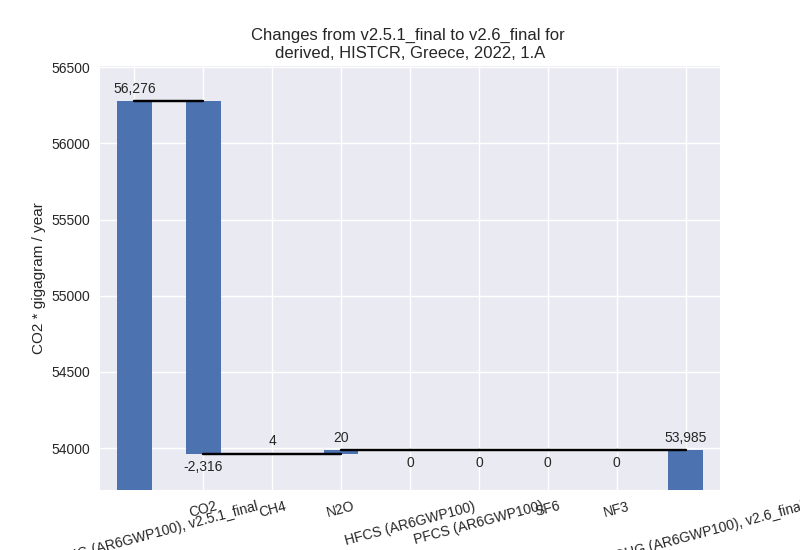
There is no subsector information available in PRIMAP-hist. - 1.B.1: Total sectoral emissions in 2022 are 346.31 Gg CO2 / year which is 0.6% of category 1 emissions. 2022 Emissions have changed by -1.4% (-4.81 Gg CO2 / year). 1990-2022 Emissions have changed by -0.0% (-0.15 Gg CO2 / year).
- 1.B.2: Total sectoral emissions in 2022 are 131.24
Gg CO2 / year which is 0.2% of category 1 emissions. 2022 Emissions have
changed by -16.3% (-25.55 Gg CO2 /
year). 1990-2022 Emissions have changed by -0.8% (-0.77 Gg CO2 / year). For 2022 the
changes per gas
are:
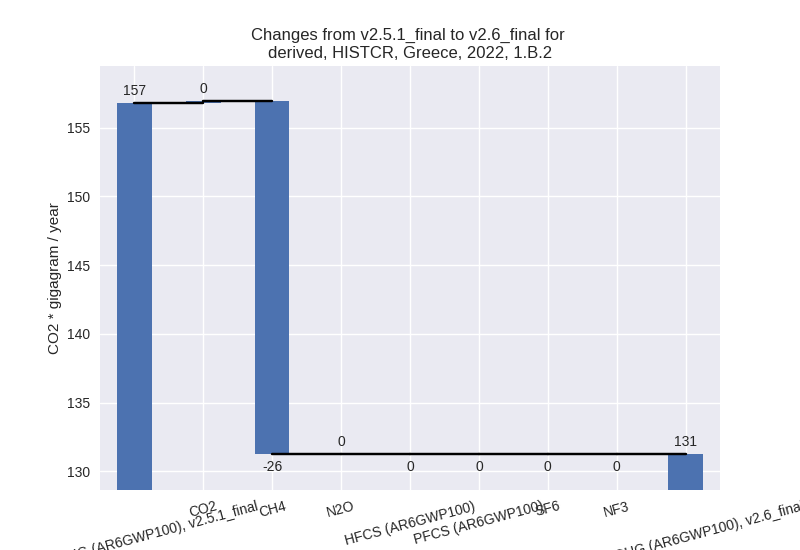
There is no subsector information available in PRIMAP-hist.
- 1.A: Total sectoral emissions in 2022 are 53984.88
Gg CO2 / year which is 99.1% of category 1 emissions. 2022 Emissions
have changed by -4.1% (-2291.36 Gg
CO2 / year). 1990-2022 Emissions have changed by -0.1% (-74.39 Gg CO2 / year). For 2022 the
changes per gas
are:
- 2: Total sectoral emissions in 2022 are 10383.55 Gg
CO2 / year which is 13.1% of M.0.EL emissions. 2022 Emissions have
changed by -7.1% (-799.44 Gg CO2 /
year). 1990-2022 Emissions have changed by -0.5% (-62.28 Gg CO2 / year). For 2022 the
changes per gas
are:
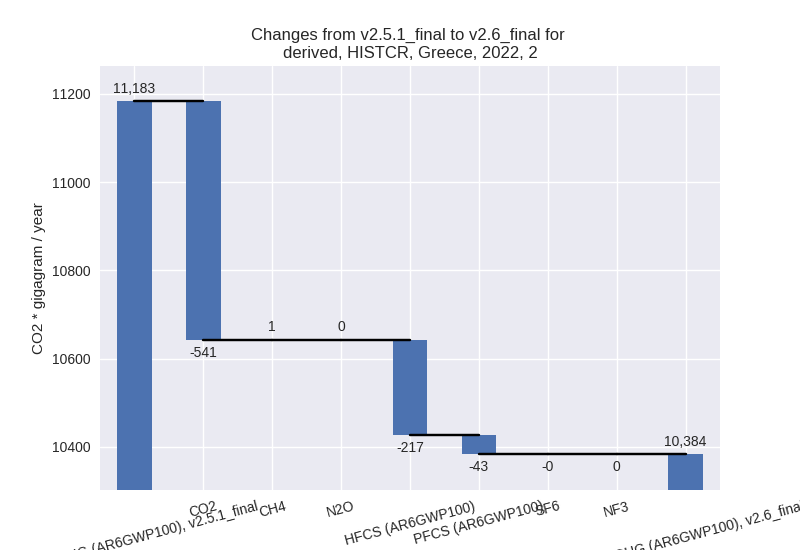
- M.AG: Total sectoral emissions in 2022 are 8051.41 Gg CO2 / year which is 10.2% of M.0.EL emissions. 2022 Emissions have changed by -0.1% (-7.38 Gg CO2 / year). 1990-2022 Emissions have changed by 0.2% (17.41 Gg CO2 / year).
- 4: Total sectoral emissions in 2022 are 6226.95 Gg
CO2 / year which is 7.9% of M.0.EL emissions. 2022 Emissions have
changed by 8.3% (475.63 Gg CO2 /
year). 1990-2022 Emissions have changed by 1.3% (66.89 Gg CO2 / year). For 2022 the
changes per gas
are:
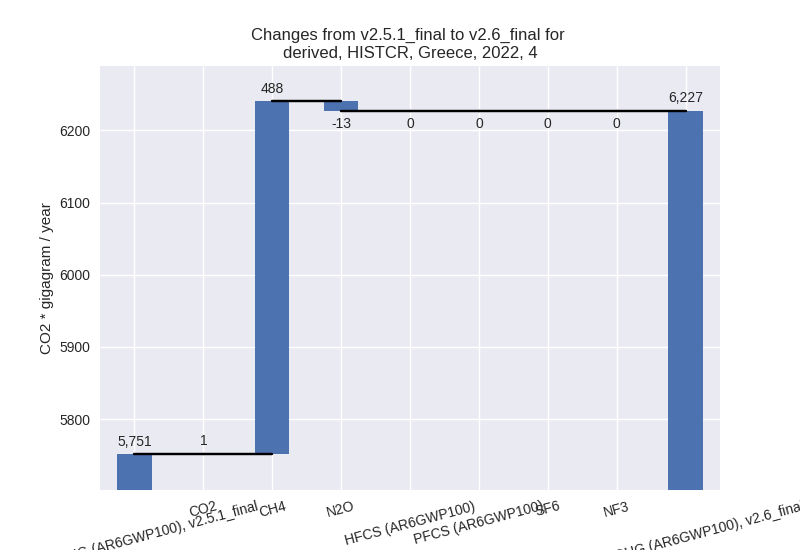
- 5: No data
third party scenario (HISTTP):
Most important changes per time frame
For 2022 the following sector-gas combinations have the highest absolute impact on national total KyotoGHG (AR6GWP100) emissions in 2022 (top 5):
- 1: 2, CO2 with -578.32 Gg CO2 / year (-13.5%)
- 2: 4, CH4 with -483.80 Gg CO2 / year (-10.2%)
- 3: 2, HFCS (AR6GWP100) with -201.93 Gg CO2 / year (-3.6%)
- 4: 2, PFCS (AR6GWP100) with -62.20 Gg CO2 / year (-21.7%)
- 5: 1.A, CO2 with 61.45 Gg CO2 / year (0.1%)
For 1990-2022 the following sector-gas combinations have the highest absolute impact on national total KyotoGHG (AR6GWP100) emissions in 1990-2022 (top 5):
- 1: 4, CH4 with -48.43 Gg CO2 / year (-1.0%)
- 2: 2, CO2 with -17.49 Gg CO2 / year (-0.3%)
- 3: 5, N2O with 10.26 Gg CO2 / year (2.4%)
- 4: 1.A, CO2 with 9.41 Gg CO2 / year (0.0%)
- 5: 2, HFCS (AR6GWP100) with -6.12 Gg CO2 / year (-0.2%)
Changes in the main sectors for aggregate KyotoGHG (AR6GWP100) are
- 1: Total sectoral emissions in 2022 are 53097.08 Gg CO2 / year which is 70.8% of M.0.EL emissions. 2022 Emissions have changed by 0.1% (61.45 Gg CO2 / year). 1990-2022 Emissions have changed by 0.0% (9.41 Gg CO2 / year).
- 2: Total sectoral emissions in 2022 are 9807.39 Gg
CO2 / year which is 13.1% of M.0.EL emissions. 2022 Emissions have
changed by -7.9% (-842.29 Gg CO2 /
year). 1990-2022 Emissions have changed by -0.2% (-25.31 Gg CO2 / year). For 2022 the
changes per gas
are:
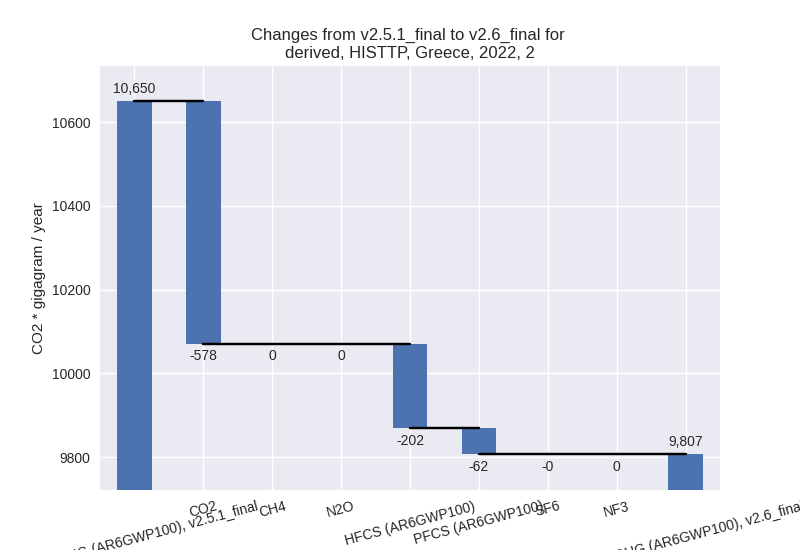
- M.AG: Total sectoral emissions in 2022 are 7329.19 Gg CO2 / year which is 9.8% of M.0.EL emissions. 2022 Emissions have changed by 0.0% (0.00 Gg CO2 / year). 1990-2022 Emissions have changed by 0.0% (0.00 Gg CO2 / year).
- 4: Total sectoral emissions in 2022 are 4509.45 Gg
CO2 / year which is 6.0% of M.0.EL emissions. 2022 Emissions have
changed by -9.4% (-468.10 Gg CO2 /
year). 1990-2022 Emissions have changed by -0.9% (-46.36 Gg CO2 / year). For 2022 the
changes per gas
are:
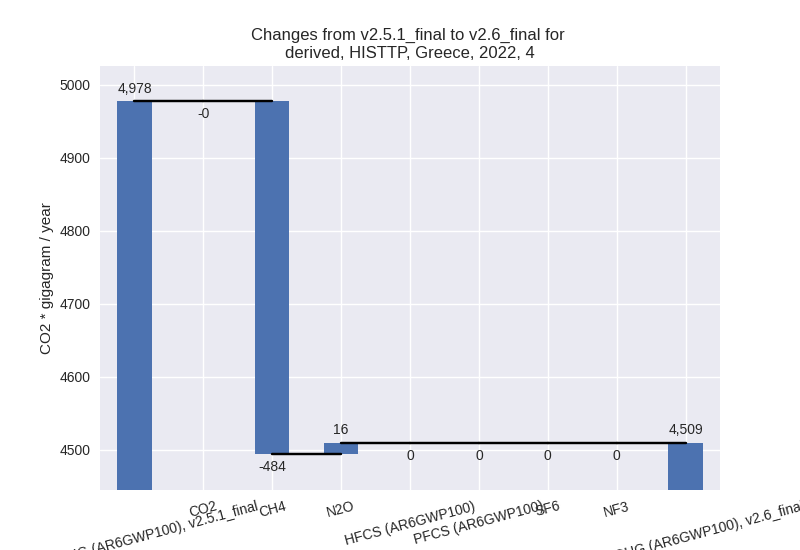
- 5: Total sectoral emissions in 2022 are 273.71 Gg
CO2 / year which is 0.4% of M.0.EL emissions. 2022 Emissions have
changed by 27.8% (59.55 Gg CO2 /
year). 1990-2022 Emissions have changed by 2.4% (10.26 Gg CO2 / year). For 2022 the
changes per gas
are:
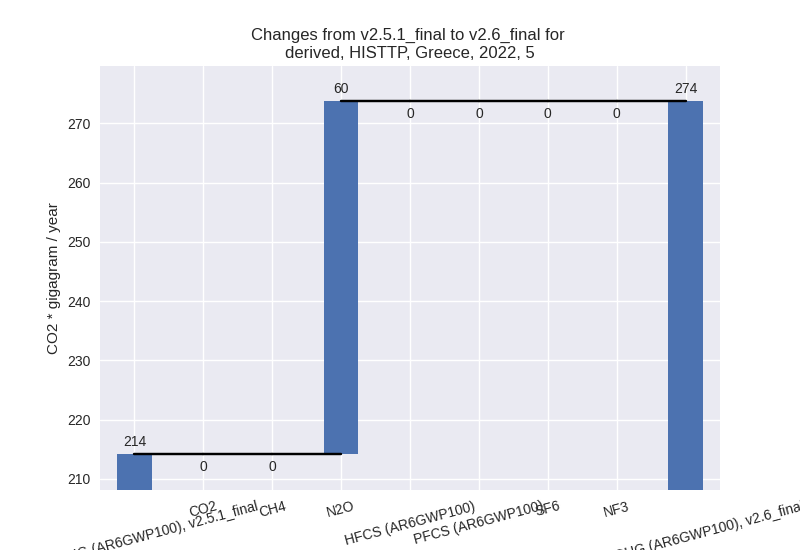
For 1990-2022 the changes per gas are: